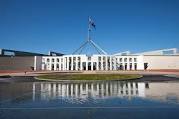Recent events may have given us a clearer understanding of one of the great values of ‘politics’ as we know it – and of why the pejorative ‘Canberra’ is such a useful epithet.

The representative democracy we have permits almost all of us to focus on the positive elements of our community – not to be regularly reminded of the differences that exist.
This is the sad reality that came to me far too soon after the result of the marriage equality poll was announced. Quite suddenly the euphoria was gone, replaced by the realisation that three in ten of the people of my country would – if they could – consciously and actively deprive their fellow Australians of something they themselves have and which can do no harm.
So let me concentrate on the good news. We now see what ‘politics’, ‘Parliament’ and ‘Canberra’ are for: to cover up or obfuscate deep differences of opinion that will always exist.
By codifying complex decisions and dressing them up in esoteric trappings, they lose their clarity – out of sight is out of mind. This fact lies behind the familiar jibe about laws and sausages being two things it’s better not to see being made.
And it becomes clearer now why so many people ascribe to ‘Canberra’ all the negativity normally associated with death, taxes and certain other unpleasant phenomena. ‘Canberra’ is, if you like, an impersonal collective noun for people who have the unenviable task of making judgement calls on matters of great complexity which, to those they represent, may be seen as black or white.
Pity the poor politician, so often wedged. Really.
‘Parliament’ is in this context a civic sobriquet used to dignify the unpalatable; to allow people in the pub and club to go on with their drinking untroubled by the fact that some of those around them are different.
Armed with this better understanding I suppose I must stop kicking against the pricks so much in defence of Canberra’s good name. The pejorative relates to what is done here, not what it’s like as a place in which to live.
In a piece last year called Marriage equality and greyhounds I discussed some of the relative merits of representative democracy and a system of ‘direct democracy’. In the latter, public policy issues, including proposed legislation, are determined by a vote of the entire body of adult citizens.
Having just experienced a dose of the latter on marriage equality, I see that I was not strong enough in condemning the idea. After the event I have a personal feeling of divisiveness on the matter.
In that piece I asked why the issue of marriage equality should be subject to a national poll but not the future of the greyhound industry. Those greyhounds were of course poetic proxies for other issues I hold dear, like a fair go for people in rural and remote areas, and equal access for everyone to education and health.

Marriage equality, we were told, is different because it is an issue “based in faith or conscience”. But the idea that there are only very few issues of this kind devalues the notion of ‘conscience’. The matter of marriage equality is critical in ensuring that some people can self-actualise to the greatest extent possible. But would we not say the same for access to meaningful work, home and shelter, education and health services?
Imagine if there was a non-binding, taxpayer-funded opinion poll on whether steps should be taken to subsidise access for rural people to nursing services or the internet. Anything less than a 100 per cent ‘Yes’ vote would divide us, – or at least would divide me, – through the realisation that, to some people, poor access for others does not matter or is not a priority.
A system of Citizens’ Initiated Referenda would continuously remind us of our differences. Right now I am worried about the 31 percent who actively want to deny equality. What if their number includes my neighbour, with whom I share dustbin and lawn-mowing duties in true brotherhood?
And what is (or was) the attitude of those of my friends who adhere to a set of beliefs structured around a deity of some kind or another? Did they opt to seek actively to deny something to my children and to theirs that has been available to them and to me?
For which of my friends did ‘Not In My Back Yard’ trump ‘Live and Let Live’? For which did adherence to a code of unwritten law sourced in religious belief trump ‘do no harm’? For whom did culture and custom outweigh compassion and understanding?
This is all too horrid. Better we agree that representative democracy is the best way, including for how it delegates to an elected few the difficult decisions, and permits the rest of us the option of keeping quiet, not saying, abrogating openness.
Let us trust debate and deliberation among our representatives in Parliament to determine people’s access to food, education, health and shelter, all of which must be matters of faith and conscience to those who make the decisions.
Then we can get back to the bar.
And to help excuse my negativity let it be my shout.
pic from the Australian

Thoughtful and perhaps ( realistically) a tad resigned.